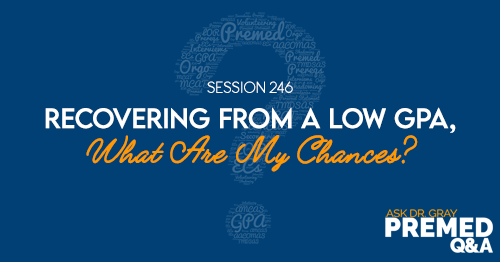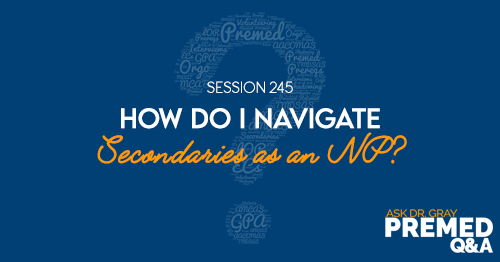Apple Podcasts | Google Podcasts
Session 199
This premed has had a rocky undergrad path which leads to poor grades. She wants to know where she should go from there.
Ask Dr. Gray: Premed Q&A is brought to you by Blueprint MCAT. Listen to this podcast episode with the player above, or keep reading for the highlights and takeaway points.
The episodes in this podcast are recordings of our Facebook Live that we do at 3 pm Eastern on most weekdays. Check out our Facebook page and like the page to be notified. Also, listen to our other podcasts on MedEd Media. If you have any questions, call me at 617-410-6747.
[00:42] Question of the Day
“By the time I’m graduating next semester, I will graduate with a 3.0 GPA. In my last year, I decided that I wanted to go to medical school. That was my plan when I first started college but talked myself out of it. I became really discouraged with the idea of being in school for 10-12 years. I didn’t have a good support system to talk me through those things.
Once I decided to go, I obviously had this big hurdle with my GPA. I have worked full-time for the past four years. So I don’t really have a lot of extracurriculars. I’m currently working on doing more volunteering opportunities and getting more activities outside of school to add to my application.
And so, I want to do a master’s in chemistry and research. I’m getting an EMT certification and working as a hospital aide. I started volunteering at a cancer research institute near me. I don’t have this early interaction with patients, but I’m set to start working as a scribe next year. I’m doing things to just show that I do have an interest in this, but I don’t have a great academic record. ”
[03:36] Getting a Degree vs. Taking Classes
A Mindset Change
Do your activities for yourself, not for the admissions committees. Do the things that you want to do. Get clinical experience to prove to yourself that you like taking care of patients. Get shadowing to prove to yourself that you understand that you like the role of a physician. Do it for yourself, and then show them.
Getting a Chemistry Degree
A second degree doesn’t help anything. It’s not the degree. It’s taking classes, and doing well to show that you are academically capable of doing well in medical school.
So, don’t worry about getting a second degree. Rather, the goal is to take more classes and take as many upper-division classes as possible.
If you don’t think you have a foundational knowledge base that’s good enough to improve and do well in the next upper-division class, then you should potentially think about retaking it.
But if you don’t need to retake it for that reason, then there’s really no reason to retake those classes. Just take other science classes such as cell biology, genetics, and other upper-division science classes, to help show that you are academically capable of doing well in medical school.
Getting a Master’s
I typically don’t recommend master’s programs, unless you need to do it for financial reasons. And taking undergrad classes doesn’t qualify you for financial aid anymore.
'Schools seem to like undergraduate courses better than master's courses to prove academic ability.'Click To TweetThere are plenty of schools out there that will look at that master’s program favorably. But generally, undergrad is going to be a little bit better if you can do it.
[09:43] Is Research Necessary?
Research is one of the most overrated parts of a medical school application. You don’t have to have research. If you want to have research, great. But you don’t have to have it. So don’t delay things or change things around just to get research.
[10:38] Will an EMT Certification Help?
The certification doesn’t mean anything, but it’s what you’re going to do with it. If you can work as an EMT, great. If you’re not going to work as an EMT, then you’re taking the class for nothing.
[11:53] Final Thoughts
Again, there’s no need for another degree. You just have to take the classes, particularly prereqs classes. But you don’t need to get a degree. Just classes. You have to take undergraduate classes because a master’s will not fulfill prereqs.
The typical prereqs classes you need are one year of Chemistry, one year of Biology, one year of Physics, one year of English, and one year of Organic Chemistry and Biochemistry. Again, a master’s program will not fulfill those.
Lastly, when you start prepping for the MCAT which is going to be a big part in your journey, check out Blueprint MCAT to help you with your study prep.
Links:
Medical School HQ Facebook page
Medical School HQ YouTube channel
Instagram @MedicalSchoolHQ
Join the Application Academy!
The Premed Playbook: Guide to the Medical School Personal Statement
The Premed Playbook: Guide to the Medical School Application Process
SEARCH SITE
LISTEN FOR FREE












